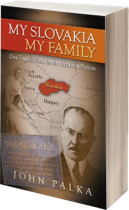James Ramon Felak, Professor of History, University of Washington
November 2, 2012
John Palka, scion of one of the most distinguished families in the history of Slovakia, has written a beautiful account of the history of his family within the context of developments in his ancestral homeland. Incorporating social, cultural, and political history, Palka interweaves a sweeping account of Slovakia over the past several centuries with the story of a family situated at the heart of the major developments and events of that history.
Palka’s ancestors are unique and significant for a number of reasons. At a time and place where nearly all business owners were German, Hungarian, or Jewish, Palka’s family were successful Slovak entrepreneurs. Moreover, as leading members of the nascent intelligentsia of an emerging Central European nation, the Hodžas were at the head of the political, cultural, professional, and religious life of nineteenth century Slovakia. As Lutheran pastors, they were important figures in Slovak religious life. Politically, Michal Miloslav Hodža was one of the three leaders of the Slovaks during the Europeanwide Revolution of 1848. The Hodža family also boasted a number of impressive, educated women, one of whom kept up a lifelong correspondence with one of Slovakia’s greatest national poets.
Along with a rich account of nineteenth century life in the Habsburg Empire as seen through the experiences of his ancestors, Palka shifts to high politics as he presents interwar and wartime Slovak history through the figure of his illustrious grandfather, Milan Hodža, the leader of the Slovak Agrarian Party who helped midwife the birth of Czechoslovakia, served it as foreign minister and prime minister, and worked to restore it as an exile in London and Chicago during the World War II.
Little is known of Slovakia in the West. Few good histories exist, and what little there is deals mainly with the twentieth century. Palka’s book should interest scholars of the history of the Habsburg Empire, nineteenth century romantic nationalism, and European politics between the two world wars. It should also gain a wide readership among Slovaks and Czechs living in the United States and Canada. History comes alive when seen from the perspective of flesh and blood human beings situated in the midst of major historical developments. John Palka has given us an account of Slovakia’s history that engages the reader by making it personal.
